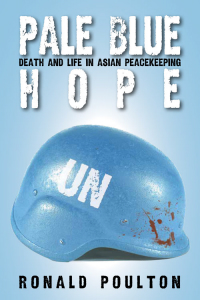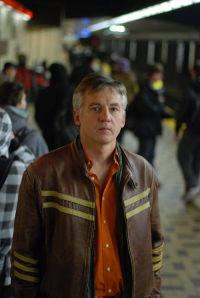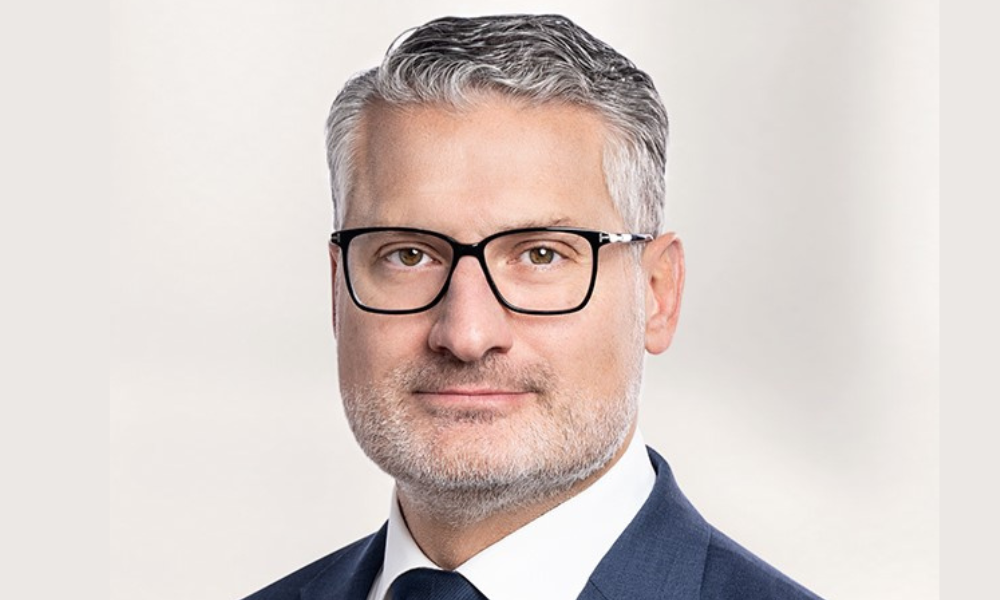
(Dushanbe, Tajikistan — March, 1999)
We take our seats at school desks, the kind with a lone arm that ascends from a chair to a small surface for writing on. We are in the prison classroom, a narrow but long room with a blackboard lining the entire back wall. The three judges sit around the teacher’s desk. This is the people’s court, a panel of judges made up of one professional jurist and two laypersons, the Soviet judge and jury system combined into a single unit. Everyone is bundled in winter coats. The woman member of the court looks sad. Throughout the trial she will busily take notes on long, blank paper. It is the official transcript of what is said. The professional judge, presiding as the chief of the trial, paces behind the desk as we wait, or moves frequently between the classroom and the fire escape located just behind his desk to keep fresh tobacco in his lungs. I am surprised that smoking inside the court/classroom is prohibited.
Apart from the judges, there is the defence lawyer, the prosecutor, our counsel, Jawid, Jozef, and me in the court. Every other seat in the class is occupied by guards, in their long green winter coats, fur hats, and pale, youthful faces. Every one of them seems to have bad skin. Each carries the standard-issue wooden truncheon.
An hour goes by without the trial commencing. Jozef, who has been smoking with the judge on the fire escape slides into the seat next to me and leans over. “I spoke with the judge outside,” says Jozef. “He says he wants to finish the trial fast and convict them so we can go home.”
“Great,” I say. “Did he mean it?”
Jozef shrugs. “I suppose he did. Who knows for sure with these people?”
“He was joking, Jozef. He must have been joking. I hope he was joking. Was he joking?”

At that moment a large, grizzled, and much older version of the young guards walks in, looks at us, then steps aside and turns back to the door he has just entered. He is now facing the three prisoners who are walking single file into the room, young guards on either side. Wearing track pants and tops, the accused — Mirzo Muddin, Dovudov Saidrahman, and Darveshov Yoqub — enter the room appearing relaxed but confused, as if the holding of this trial is a complete surprise to them. Two have long hair and beards, one especially long, extending to at least below his sternum.
On one wall of the room hangs a painting of clowns dancing in a closed circle. I have been staring at it since we walked in. I assume some prisoner is the artist. The prisoners stand by their chairs until told to sit. The senior guard nods and the three obediently sit in unison.
Once the prisoners are settled, the judge speaks. “Have you had a chance to speak with your lawyer?”
“No,” says the one in the middle, with the longest beard. “We don’t have a lawyer.”
The judge immediately loses his temper. “Yes you do and you have seen him. Mr. Stajin is your lawyer. This man.” The judge points and Stajin stands. The judge pulls his hand back and Stajin sits down.
The spokesman for the three says, “Okay. We have met him. Ten minutes. How can we prepare anything in ten minutes?”
The judge shouts at him, “Keep quiet! You are on trial for murder. Have some respect and talk only when talked to.”
Through all of this, Jawid is alight with fascination. In his life he has never dreamed to be in such a place watching the two extremes of his country, the radical Muslims and the president’s men, face off against each other in a court of law.
The charges are read to the men by the prosecutor, a tall, dark-haired man in a leather winter coat. He is dispassionate and aloof and not the same prosecutor we had met with previously. The three accused sit without expression. One constantly strokes the length of his beard. His nose is bent with an old break. Another, the youngest of the three, winks and smiles at the guards seated around him. They shake their heads at him, as friends would do to one another in mocking disbelief at some oafish misbehaviour.
With the charges formally read, the judge asks the defence lawyer if he is prepared to proceed. He answers that he has only been assigned the case one week before the trial and has met with his clients for just ten minutes. But he does not seem to be protesting the unfairness of the process.
“Now,” the judge announces. “The accused will speak.” In a Tajik trial, I learn, the accused are compellable, which means they are obligated to make a statement and to answer questions. There is no right to remain silent or presumption of innocence. Without investigative techniques or forensic evidence, the state relies on the words of an accused to prove its case. I ask myself what would happen if they refused to speak. I soon have my answer.
The judge is now yelling at them. “You must speak. If you do not speak, I will find you guilty and that is that.”
Mirzo Muddin, the accused with the longest and darkest beard, announces that they will not talk in the court.
Jawid sits whispering his translations into my ear. “Why should we say anything?” says Mirzo Muddin. “This is unfair procedure. We are innocent. Nothing more.”
After translating the last sentence spoken, Jawid says to me, “He does not know what this trial is, I think.”
The judge looks over to where Jozef and I sit, his face reddening in growing agitation. I can see his yellowed fingers fervently flipping through pages of some document.
“Look,” he says, straining to keep his voice calm. “You must speak now. It is your chance to prove to us that you are innocent —”
“We are innocent —”
“Don’t interrupt! You will have your chance. You will have a chance to say as much as you want. The United Nations is present to hear you.” He points to us, and the accused look our way.
Mirzo Muddin then begins talking directly to me.
Before Jawid can translate, the judge slams his hand down. “Don’t talk to them. Talk to the court.”
Muddin stops and shakes his head. As he speaks, the judge grows enraged and begins shouting. Jawid has stopped translating, as though it is too much to repeat. I understand what is happening. Muddin continues to refuse to make a statement and the judge continues to lambaste him for it.
The three members of the people’s court suddenly stand. The judge waves his arms and shouts. Jawid says, “They are stopping to let accused’s lawyer speak with his clients. He must convince them to speak to the court. If they do not, the judge will continue with the case and convict them.”
Excerpt of Pale Blue Hope: Death and Life in Asian Peacekeeping √ÃÆ’‡Â¬Â© Ronald Poulton. Reprinted by permission of Turnstone Press Ltd. (Winnipeg)










